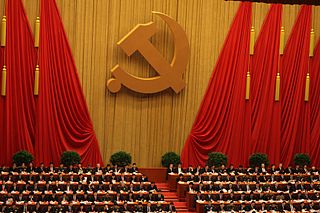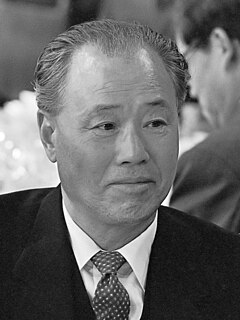
The Central Secretariat of the Communist Party of China is a body serving the Politburo of the Communist Party of China and its Standing Committee. The secretariat is mainly responsible for carrying out routine operations of the Politburo and the coordination of organizations and stakeholders to achieve tasks as set out by the Politburo. It is empowered by the Politburo to make routine day-to-day decisions on issues of concern in accordance to the decisions of the Politburo, but it must consult the Politburo on substantive matters.
The 16th National Congress of the Communist Party of China was held in Beijing between November 8th and 14th, 2002. 2,114 delegates and 40 specially invited delegates elected a 356-member 16th CPC Central Committee, as well as a 121-member Central Commission for Discipline Inspection (CCDI). The Congress marked the nominal transition of power between Jiang Zemin and Hu Jintao, who replaced Jiang as General Secretary, and a newly expanded Politburo Standing Committee line-up. The institutional transition would be completed in state organs by the 2003 National People's Congress in March. Jiang, however, remained head of the Central Military Commission, therefore in practice, the power transition was not complete.

The leader, now officially the General Secretary of the Central Committee (CC) of the Communist Party of China (CPC), is by right of office the Chairman of the Central Military Commission and the President of the People's Republic of China. Since its formation in 1921, the leader's post has been titled as Secretary of the Central Bureau (1921–1922), Chairman, and General Secretary.
The 12th Politburo of the Communist Party of China was elected at the 1st Plenary Session of the 12th Central Committee on September 13, 1982, consisting of 25 members and 3 alternate members. It served until 1987. It was preceded by the 11th Politburo of the Communist Party of China. This politburo was reorganized in September 1985, with a retirement of senior members and election of new members. It was succeeded by the 13th Politburo of the Communist Party of China.
The 11th Central Politburo of the Communist Party of China was elected at the 1st Plenary Session of the 11th Central Committee on August 19, 1977, consisting of 23 members and 3 alternate members. There were additions to the membership in 1978 and 1979. It served until 1982. It was preceded by the 10th Politburo of the Communist Party of China.
The 10th Politburo of the Communist Party of China was elected at the 1st Plenary Session of the 10th Central Committee on August 30, 1973, consisting of 21 members and 4 alternate members. There were additions to the membership in 1973 and 1977. It was informally supervised by the Politburo Standing Committee of the Communist Party of China. It was preceded by the 9th Politburo of the Communist Party of China.
The 9th Politburo of the Communist Party of China was elected at the 1st Plenary Session of the 9th Central Committee on April 28, 1969 and sat in session until August 1973, consisting of 21 members and 4 alternate members. It met for four years, during the middle of the politically insoluble Chinese Cultural Revolution. It had been preceded by the 8th Politburo of the Communist Party of China.
The 8th Politburo of the Communist Party of China was elected at the 1st Plenary Session of the 8th Central Committee on September 28, 1956, consisting of 17 members and 6 alternate members. This Politburo was preceded by the 7th Politburo of the Communist Party of China.
The 7th Politburo of the Communist Party of China was elected at the 1st Plenary Session of the 7th Central Committee on June 19, 1945, consisting of 13 members. It was actively preceded by the 6th Politburo of the Communist Party of China. There were additions to the membership in 1955.
The 14th Central Committee of the Communist Party of China was in session from 1992 to 1997. It held seven plenary sessions. It was preceded by the 13th Central Committee. It was most certainly succeeded by the 15th Central Committee of the Communist Party of China.
The 12th Central Committee of the Communist Party of China was in session from September 1982 to November 1987. It held seven plenary sessions. It was securely succeeded by the 13th Central Committee.
The 11th Central Committee of the Communist Party of China was in a 5 year session from 1977 to 1982. The 10th Central Committee of the Communist Party of China preceded it. It held seven plenary sessions in the 5-year period. It was formally succeeded by the 12th Central Committee of the Communist Party of China.
The 8th Central Committee of the Communist Party of China was in session from 1956 to 1969. It was most certainly preceded by the 7th Central Committee of the Communist Party of China. It held 12 plenary sessions in this period of 13 years. It was the longest serving central committee ever held by the Communist Party.
The 6th Central Committee of the Communist Party of China was in session from 1928 to 1945, during most of the Chinese Civil War, and during the Second Sino-Japanese War. It held seven plenary sessions in this period. It was formally preceded by the 5th Central Committee of the Communist Party of China. It was the first central committee to have Mao Zedong as a high ranking member. It was succeeded by the 7th Central Committee.

The 18th National Congress of the Communist Party of China began on November 8, 2012 at the Great Hall of the People. Due to term and age limits restrictions, seven of the nine members of the powerful Politburo Standing Committee (PSC) retired during the Congress, including Hu Jintao, who was replaced by Xi Jinping as General Secretary of the Communist Party of China. The Congress elected the 18th Central Committee of the Communist Party of China, and saw the number of Politburo Standing Committee seats reduced from nine to seven.
The organization of the Communist Party of China (CPC) is based upon the Leninist idea of democratic centralism.
The 19th National Congress of the Communist Party of China was held at the Great Hall of the People, Beijing, between 18 and 24 October 2017. 2,280 delegates represented the party's estimated 89 million members. Preparations for the 19th National Congress began in 2016 and ended with a plenary session of the Central Committee a few days prior to the Congress. In 2016, local and provincial party organizations began electing delegates to the congress as well as receiving and amending party documents.






